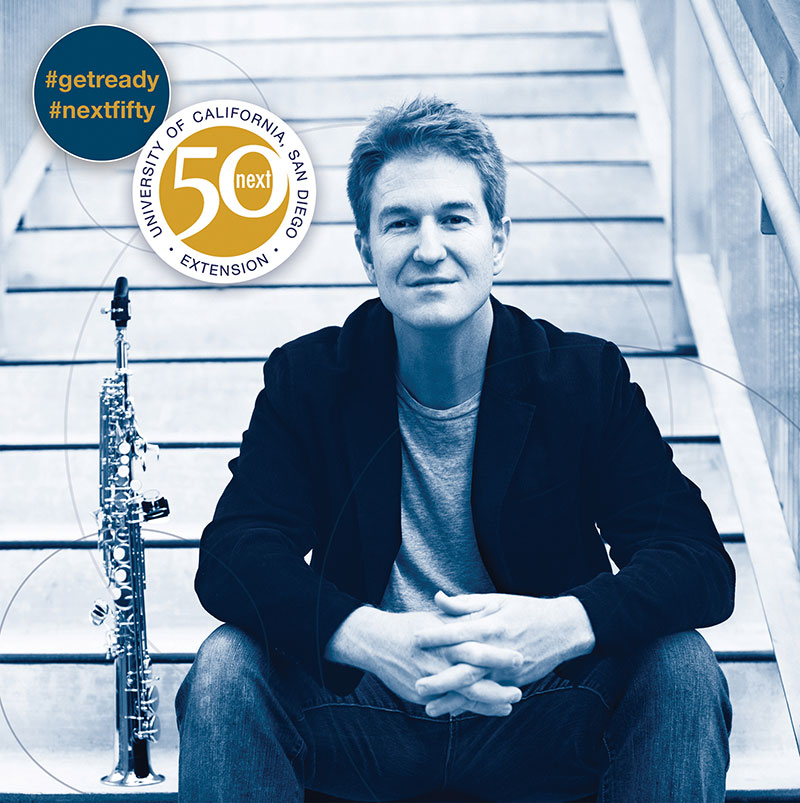17 May 2016
50 Voices of the Future: David Borgo on innovation in jazz

In honor of UC San Diego Extension's first 50 years, 50 Voices of the Future asks thought leaders about the trends, breakthroughs and social advances they foresee over the next 50 years.
Music is much more than notes on a computer screen to David Borgo. As a saxophonist, ethnomusicologist, and professor, he considers music a way for humans to communicate with respect and to learn from each other. Also an electronic music maverick, he uses every tool at his disposable to further his work and his students’ knowledge.
Borgo records and performs electro-acoustic improvisation with his duo KaiBorg, and original polyrhythmic music with his sextet Kronomorfic. At UC San Diego, he teaches undergraduate and graduate courses, including small seminars, large lectures and small ensembles. For example, one of his large freshman courses is in the Culture, Art and Technology sequence. That class explores the social history of sound recording, moving from Edison’s phonograph to the latest sound production, distribution and consumption practices. Along with jazz history and ensembles for undergraduates, Borgo leads graduate seminars in ethnomusicology and music cognition. Each year, he participates in the UC San Diego Jazz Camp, which provides an opportunity to reach students before they enter college. (The deadline to enroll in Jazz Camp is May 23.)
(1) Why is the work you do important?
Music is one of the most important windows into the human condition. It affects our emotions and identities, and it deeply impacts society. Humans make and enjoy music in extraordinarily diverse ways, but we all share the cognitive faculties and biological propensity to do so, hinting at music’s evolutionary and cultural significance.
Art also shows us at our very best, offering insight into how to respect and relate to one another. For me, the simple act of listening deeply improves our relationships with other people, with the natural environment, and with other organisms that share the world with us.
(2) What are the influential/exciting developments happening in your field now and why?
As an artist of improvised music and jazz, it’s an exciting time. We can make connections with musicians all around the world who bring with them their own musical traditions and ways of doing things.
Technology also extends the total musical palette, but it creates its own strange loops. Computers don’t understand music the way humans do, so we design algorithms to guide them, yet in doing so, we often betray our implicit biases about what we think makes music meaningful or good. Algorithms ultimately reflect the values of the people who design them.
(3) What’s the next big thing?
What’s remarkable about music is some of the oldest music can sound the most modern. Often the goal is to get beyond one’s own world view. How can we better engage with people in a more harmonious and respectful way? Music invites us to recognize our shared humanity by respecting our immense and exciting differences.
Humans have always used technology to engage and understand their world, so clearly the latest technologies provide more opportunities. Sonically we can harness and create other-worldly sounds and interact in new ways, but ultimately I hope that we harness technology to teach us to listen more closely to one another.
(4) How big of an impact will your field play in shaping the future of the San Diego region and beyond?
Music works from the ground up. To be in the presence of music being made is a transformative experience. One goal is to enliven the San Diego music scene. San Diego is becoming more diverse and more connected, globally.
The ground up for me means engaging the students in the classroom. I always make a point of playing with them, because it’s better for them to learn with more experienced players. Ultimately you hope that students leave with expanded sensitivities, an enlarged world view, and a sharper critical lens for engaging the world.
(5) Hop into your time machine…what does the future look like for this field in 50 years? How can individuals/companies get prepared for what’s next?
Music technologies allow us to explore sounds in exciting new ways, but the interfaces we have between humans and machines are still in their infancy. Nothing yet approaches the violin or saxophone when it comes to complexity, nuance and intimacy. There is no technological interface that comes close. But they will get better.
We’re learning to feel and explore and understand the body in different ways. Music and sound offer a powerful way to do so. The world in 50 years will sound very different and look very different, but we’ll also be engaged by the same deeply human concerns and questions.
Learn more about UCSD Jazz Camp and explore our Performing Arts courses in Singing, Guitar, Piano and more.